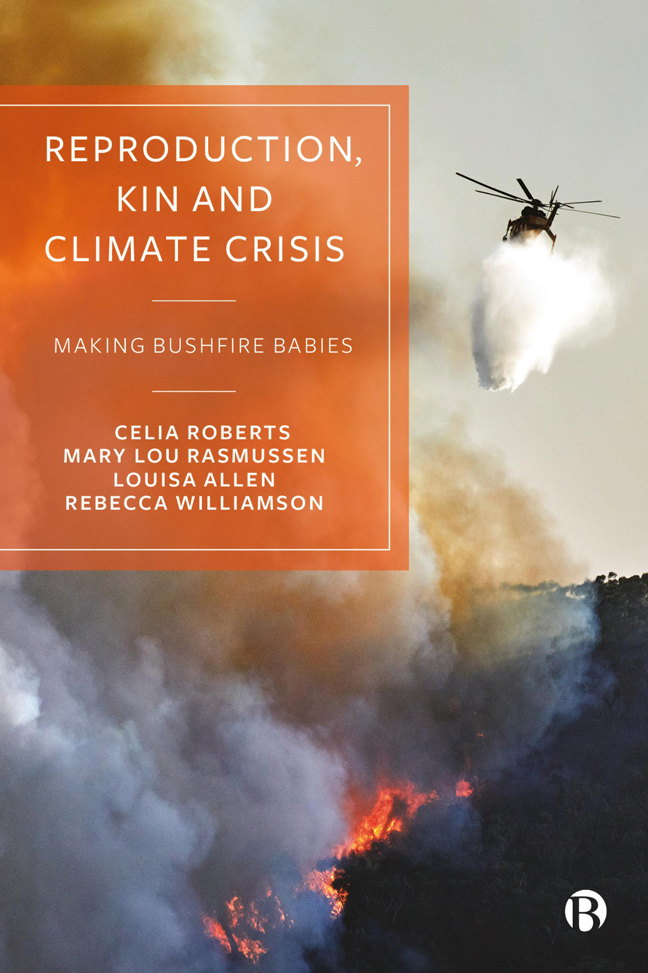Book contents
- Frontmatter
- Contents
- List of Figures and Table
- Notes on the Figures
- Notes on the Authors
- Acknowledgements
- Interleave 1
- 1 Reproducing in Climate Crisis
- Interleave 2
- 2 Methods in Crisis
- Interleave 3
- 3 Breath, Breathing and ‘Mum-Guilt’
- Interleave 4
- 4 Smoke, Machines and Public Health
- Interleave 5
- 5 Kin, Care and Crises
- Interleave 6
- 6 Pyro-reproductive Futures
- Interleave 7
- 7 Making Bushfire Babies
- Notes
- References
- Index
3 - Breath, Breathing and ‘Mum-Guilt’
Published online by Cambridge University Press: 24 January 2024
- Frontmatter
- Contents
- List of Figures and Table
- Notes on the Figures
- Notes on the Authors
- Acknowledgements
- Interleave 1
- 1 Reproducing in Climate Crisis
- Interleave 2
- 2 Methods in Crisis
- Interleave 3
- 3 Breath, Breathing and ‘Mum-Guilt’
- Interleave 4
- 4 Smoke, Machines and Public Health
- Interleave 5
- 5 Kin, Care and Crises
- Interleave 6
- 6 Pyro-reproductive Futures
- Interleave 7
- 7 Making Bushfire Babies
- Notes
- References
- Index
Summary
The material presence of breath and embodied act of breathing offer an ‘organizing concept’ (Choy, 2020) for our thinking in this chapter. We trace breath and participants’ accounts of breathing to see where they lead in making sense of their experiences of bushfires and the pandemic. Drawing on feminist new materialist thought that recognizes breath as intra-active phenomena (Barad, 2007; Górska, 2016), we configure breath as a mode of reflection and attention to the material politics of living through crisis. Here, breath acts as a form of sense making, ‘a force that not only materializes, recognizes and manifests social power relations but also forces social and environmental transformation’ (Górska, 2016: 253). In the discussion that follows, we suggest breath is a material force that shapes the lived experiences of participants by materializing mother subjectivities responsible for the health and wellbeing of their children in these crises. Such responsibility is bestowed in smoky and virus-filled atmospheres over which humans exercise minimal (if any) control. When mothers realize the impossibility of this task, some experience what one participant characterized as ‘mum-guilt’. This is a feeling of personal ‘failure’ to prevent children's exposure to the effects of smoke and the COVID-19 virus.
This work contributes to a theorization of breath and breathing as feminist politics (Irigaray, 2004; Ahmed, 2010; Górska, 2018). Who gets to breathe, and who doesn’t, can provoke questions about social, political and economic privilege and how this is sustained (Górska, 2016). Within such scholarship, breath is recognized as ‘a lively and deadly force not only physiologically but also affectively and socially’ (Górska, 2018: 253–254). As Sara Ahmed (2010) explains, breathing serves as a powerful metaphor for claiming presence and breathable existence in spaces of marginalization and discrimination like queer and post-colonial politics:
The struggle for a breathable life is the struggle for queers to have space to breathe. Having space to breathe, or being able to breathe freely is … an aspiration. With breath comes imagination. With breath comes possibility. If queer politics is about freedom, it might simply mean the freedom to breathe.
(Ahmed, 2010: 120)The pursuit of breathable lives has received recent international attention in relation to racial discrimination and anti-Black violence in the US. Black American George Floyd was choked at the knee of a Minneapolis police officer while saying “I can't breathe”.
- Type
- Chapter
- Information
- Reproduction, Kin and Climate CrisisMaking Bushfire Babies, pp. 51 - 74Publisher: Bristol University PressPrint publication year: 2023



